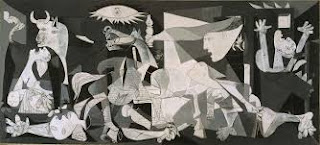But here's the thing, art has always been political.
Hear me out.
Before the 20th century and the push for high literacy rates, art was one of the only ways people could make grand statements for everyone to witness. It was a means of showing off wealth and power. Whoever had the wealth and power, got to decide what kind of art was made. Why do you think there are so many pictures of the Holy Mother with Baby Jesus in art museums?
Art was commissioned through paintings, sculptures, architecture, fashion, poetry, and plays and could be used to entertain, educate, and celebrate.
What about even further back in time? I'm talking about early recorded history and prerecorded history. Cave paintings often depicted hunts, what animals to eat and which to avoid at all costs. Other early works often held religious significance or denoted who held power in a society. It was about making a statement to another person or group.
Art records history, or at least what the winners define as history. Art sets beauty standards, especially for women. Art reflects the idealization of a time period, often to the point of gross exaggeration. Art makes a statement.
Art is political.
One example I am most familiar with is Diego Rivera. He was an amazing artist, but his work always caused a stir in the United States. He was an outspoken supporter of Communism, but was commissioned to create several murals within the United States. I've seen his murals in the Detroit Institute of Art and can verify that they are beautiful works that celebrate the American worker. However, his talent couldn't save all of his masterpieces and one was destroyed soon after he started working on it because of it's political message (click here for information on Man at the Crossroads and why it was destroyed).
 |
| Diego Rivera mural at the Detroit Institute of Art |
 |
| Guernica |
But I do have an interest in film history. And, yes, film is an art form.
One of my favorite film periods is 1920s German Expressionist films. These are movies like "M", "The Cabinet of Dr. Caligari", "Nosferatu", and "Metropolis". Most people probably wouldn't think of them as political art pieces. They were the equivalent of our modern day blockbusters. These movies were meant as an escape from the horrible economic situation the Germans found themselves in after World War 1, not political statements.
Yet, some film critics disagreed. In 1947, after having escaped from Nazi Germany, Siegfried Kracauer published a book called "From Caligari to Hitler: A Psychological History of the German Film". In it, Kracauer analyzes the films and social attitudes in Germany that helped to lead to the rise of Hitler. Though I haven't read the book, I did watch the German documentary while it was still on Netflix a few years ago and Kyle from "Brows Held High" has a great summary video on the subject if you click here. It's a fascinating case study.
Actually no, totally watch Kyle's 16 minute video. It's a great explanation as to why art can't be apolitical.
And modern film is still very political. Hence why we have terms like "Oscar bait" that are constantly thrown around during award season. Or why the military will help out with the film industry (hint: it's a recruitment strategy).
Which is why I get really annoyed when people tell artists, athletes, actors, writers, etc. to "stay out of politics". Just because they entertain the masses, doesn't mean that they get to leave their personal opinions at the social media door. Often their work is very political in nature and can reflect or shape attitudes within a culture.
Where would we be socially without movies like "Guess Who's Coming to Dinner", "In The Heat of the Night", "Dr. Strangelove", or "Mr. Smith Goes to Washington" ? How many English classes read "1984"?
Then again, I get annoyed with anyone who tries to silence a group of people. I'm not the biggest fan of authority in general, but that's a personal issue best left for offline.
So yeah, whether we like it or not, art is political. It always has been and it always will be. The work that gets the most notice will likely be the work that stirs up the most controversy and shocks the public.
That just seems to be our human love affair with art.
If you enjoyed this post (or it pissed you off) please like, share, and/or leave a comment. I love hearing from my readers and I hope y'all like hearing from me.
Until next week.



